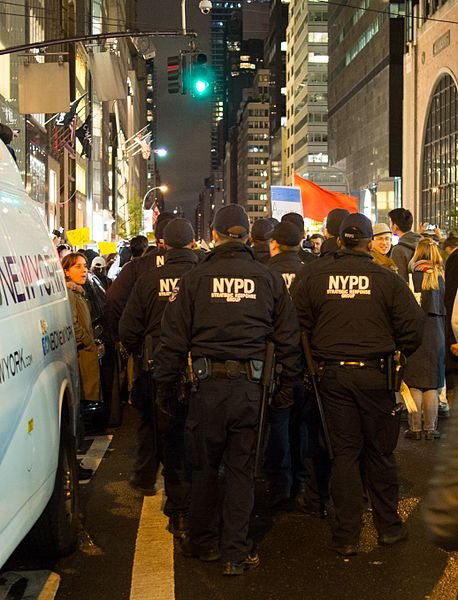
NYPD officers respond to a protest.
Last month, NYPD officers arrested veteran photojournalist Stephanie Keith while she attempted to document a candlelight vigil following the killing of Jordan Neely on a subway. After the arrest, Chief of Patrol John Chell claimed Keith had obstructed three arrests during the vigil. But video of Keith’s arrest instead shows Chell grabbing and pushing Keith and screaming to “lock her up” after she briefly stepped off the sidewalk to get a shot.
Police attempts to frame a career journalist like Keith as some rowdy protester looking for trouble are downright ludicrous (although the First Amendment protects rowdy protesters, too). Keith is a respected professional. She was part of The New York Times team nominated for a 2023 Pulitzer Prize for breaking news coverage.
Get Notified. Take Action.
Threats to press freedom around the world are at an all-time high. Sign up to stay up to date and take action to protect journalists and whistleblowers everywhere.
Email:
But it’s far from the first time that police have claimed obstruction or aggression by journalists they arrest only for video to show nothing of the sort. Why the disconnect? Well, it seems that many law enforcement officials view journalism itself as obstructive. The NYPD is no exception.
In fact, NYPD officers often go far beyond just arresting journalists. They waste taxpayer funds on petulant abuses of power — not to mention the litigation that often follows. In 2021, for example, officers assaulted photojournalist Gabe Quinones with a baton while he attempted to cover demonstrations at Washington Square Park. After he filed a complaint, officers came to his home to arrest him for grand larceny. They claimed he tried to steal the baton he was beaten with despite video of the assailant officer lashing him across the back while he ran away.
Predictably, prosecutors dropped charges. Officials don’t file these kinds of cases to win but to intimidate. They have no interest in putting their non-existent evidence before a jury.
The prior year, NYPD officers attacked another journalist, Armin Rosen of Tablet Magazine, who was covering a protest following the murder of George Floyd. The officers apparently chose to assault first and ask questions later after seeing him put something in his backpack. It turned out to be a notebook he was trying to protect from the rain. Rather than apologize, they stole his bicycle. Seriously. They left him with his bike helmet, which said “PRESS” in large letters.
According to Freedom of the Press Foundation’s U.S. Press Freedom Tracker, the beating Rosen endured was just one of 30 known arrests and assaults of journalists by the NYPD at Black Lives Matter demonstrations in 2020 (not to mention similar incidents a few months later at election-related demonstrations). Days before assaulting Rosen, police slammed a photojournalist’s head into the ground for no apparent reason while a crowd pleaded for them to let the “old lady” go. She said her camera strap almost choked her during the assault.
Officials back then cited the chaos of the times as their excuse. Police, they said, thought the people they senselessly attacked for exercising their First Amendment rights were not journalists but mere protesters, who they apparently (and appallingly) regard as fair game.
But the George Floyd protests are over and NYPD’s anti-press antics continue. In fact, journalists who got on the department’s bad side in 2020 claim officers are still retaliating against them.
Another common excuse is that journalists could avoid nightsticks and jail cells by displaying city-issued press credentials — as though the mayor’s office, or any government body, has the power to determine who qualifies for First Amendment rights. Requiring journalists to register with the government — what could go wrong? The reality is that many journalists intentionally avoid displaying press credentials for fear of being targeted by police.
To be clear, cops’ hostility to the press is far from just a New York problem. Officials in Oklahoma were recently caught on tape fantasizing about murdering reporters at a government meeting. The sheriff then threatened to prosecute the journalists for recording the conversation. A jury in North Carolina this month convicted two journalists for violating curfew while covering a homeless encampment sweep cops chose to conduct after hours at a public park. And the DOJ highlighted press freedom violations in its recent report on its investigation of the Minneapolis Police Department.
But New York is the media capital of the world, and likes to regard itself as more enlightened than supposed flyover states when it comes to civil liberties like press freedom. Sadly there’s about as much evidence that’s actually the case as there is of Keith’s alleged obstruction.
A coalition of press rights and civil liberties groups have demanded prosecutors drop charges against Keith. They should, and then Keith should sue (as should other journalists victimized by the NYPD). But even then, it’s the taxpayers that foot the bill, which is why officials seem content with paying tens of millions to settle police misconduct cases annually. Change will only come if New Yorkers — especially journalists — demand it, loudly and repeatedly.



